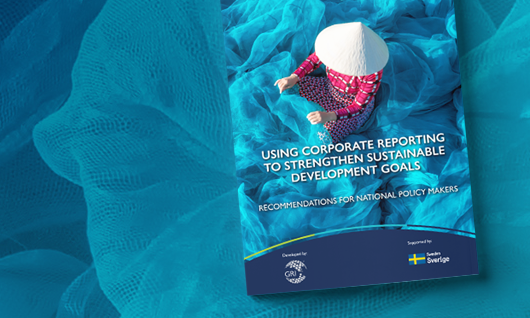
GEF earmarks $204.3 m to help UNDP scale up efforts for climate resilient future
The Global Environment Facility (GEF) has just approved $204.3 million for the United Nations Development ...

The Global Reporting Index (GRI) came up with five key recommendations on means of getting the private sector to contribute to pushing forward the Sustainable Development Goals (SDGs).
With the clock ticking on the deadline to complete the SDGs, governments need to up the pace of progress and do more to harness participation from both the public and private sectors.
GRI has set out recommendations to help policymakers work with companies to capture their contributions as part of national SDGs strategies.
This includes the Voluntary National Reviews, the annual SDGs status updates from individual countries, which offer a platform for the partnerships needed to achieve the 2030 Agenda.
The five key recommendations of the GRI’s new report “Using Corporate Reporting to Strengthen Sustainable Development Goals” show how governments and other policy actors can use corporate reporting to strengthen SDGs progress at the national level.
The GRI recommendations called for involving the private sector in every step of SDGs implementation and ensuring priorities are shared, and contributions of different businesses and sectors are understood.
The report also urged facilitating and enforcing effective SDGs disclosure by companies; such as through best practice guidelines and regulations for mandatory reporting.
The report also called for aligning with existing corporate disclosure practices and frameworks through focusing on those already widely used and working well, such as the GRI Standards.
It also urged developing a measurement and monitoring tool to track private sector input, especially through starting with the data available through sustainability reports.
The report also recommended to enable regular dialogue between business, policy and investors in order to encourage collaboration and reinforce their respective SDGs contributions.
Peter Paul van de Wijs, GRI Chief External Affairs Officer, said: “The SDGs are an ambitious set of targets to address the pressing global challenges of our times, on issues as diverse as inequality, health, poverty and climate change. And as demonstrated by the current COVID-19 pandemic, collective action is essential. Countries cannot deal alone with issues that transcend national borders.”
“With ten years to go to achieve the Goals, it is already clear that progress is too slow. Partnerships and collaboration, particularly with the private sector, are crucial. That’s why governments must harness all the tools available to assess progress and enable the step change required to avoid the consequences of falling short,” he said.
“GRI, as the leading organization for understanding and disclosing sustainability impacts, has provided practical solutions to engage companies in the process. I encourage all policymakers to do more to understand and make the most of the contribution from the private sector, at every level of their plans and actions in support of the SDGs,” he concluded.
The Global Environment Facility (GEF) has just approved $204.3 million for the United Nations Development ...
The European Bank for Reconstruction and Development (EBRD) is promoting renewable energy and low‑carbon technologies ...
Vodafone Foundation has pledged €30,000 to Save the Children in response to the devastation caused ...


اترك تعليقا